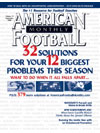AMERICAN FOOTBALL MONTHLY THE #1 RESOURCE FOR FOOTBALL COACHES
Article CategoriesAFM Magazine
|
- More Solutions to Problem #4© More from this issueContinued from: 32 Solutions for the 12 Biggest Problems You'll Face this Season Problem 4: Dealing with an early season setback such as an injury to your best player...how do you counter this setback and what is the contingency plan if this occurs? Having multiplicity in one’s scheme is very important at any level. Being a small town school we are not always blessed with great talent or depth on a consistant basis and we have to adapt within our scheme to fit what we have when we have it. Keith Wheeler, Offensive Coordinator/QB Coach Holbrook Roadrunners (AZ) The solution: injuries might happen at anytime? We need to be prepared in all faucets if we....The full article can only be seen by subscribers. Subscribe today!
|
|
|||||||
| HOME |
MAGAZINE |
SUBSCRIBE | ONLINE COLUMNISTS | COACHING VIDEOS |
Copyright 2025, AmericanFootballMonthly.com
All Rights Reserved





